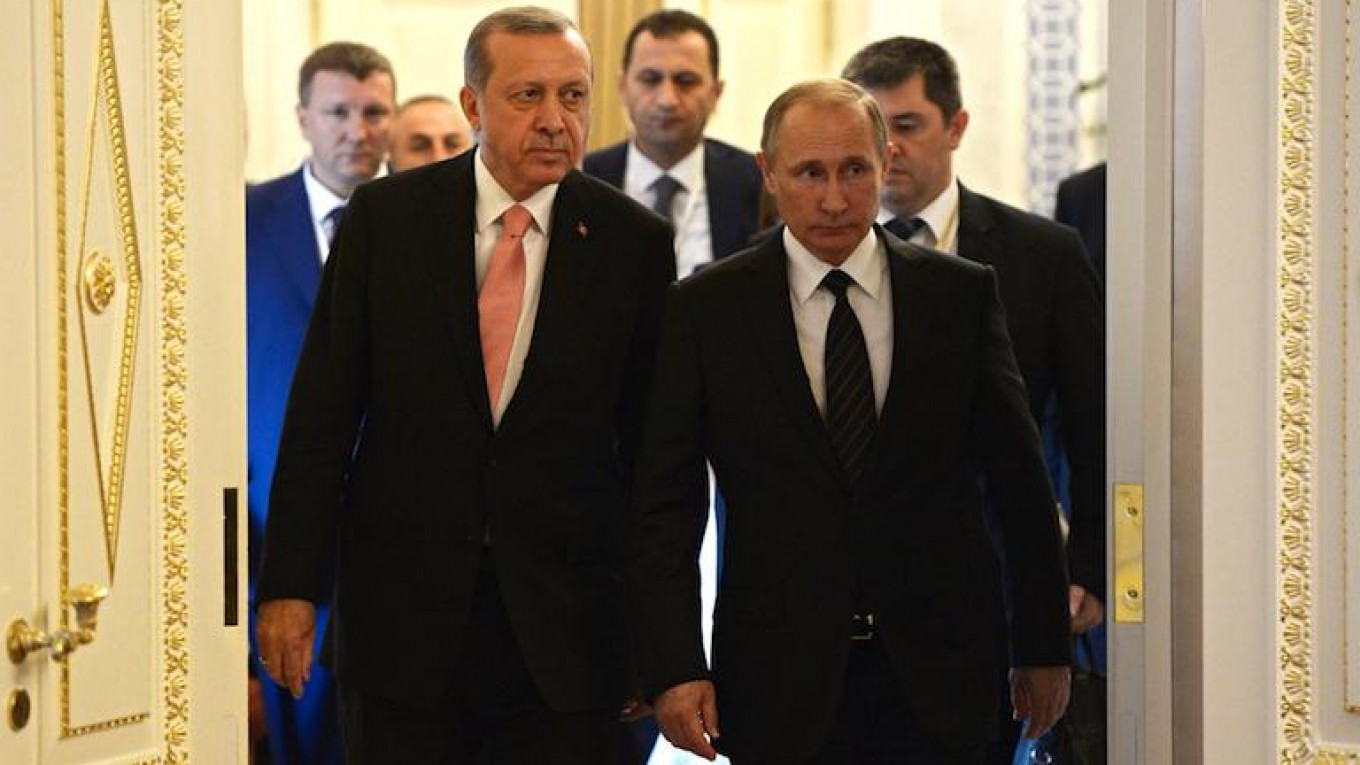Until very recently, the hot lines between Ankara and Moscow were very silent. Diplomatic ties between the two countries — cut abruptly in November 2015 after Turkey shot down a Russian fighter jet on its Syrian border — looked to be well beyond repair. The subsequent journey between that and the August 9 meeting of two presidents, Recep Erdogan and Vladimir Putin, has been as fast as it has been unexpected.
“My dear friend Vladimir and I,” began Erdogan at the Saint Petersburg talks, “have a joint position … to show the rest of the world that we will be behaving as friendly countries towards one another.” Visibly less emotional, Putin nodded, before continuing with his own, more measured words. Russia's priority was that "relations with Turkey return to the pre-crisis level of co-operation,” he said.
Only a few months ago, Russian state media accused Erdogan of having links with ISIS.
Much as trailed, Moscow also agreed to gradually lift sanctions off Turkish businesses, which had been imposed since the downing of the plane. Charter flights would, once again, fly Russian tourists to Turkish resorts. The ban on Turkish imports would be lifted before the end of 2016.
Erdogan, on his part, agreed to go ahead with the Turkish Stream gas pipeline, which had been put on hold as a result of the dispute.
Blackmailing the West
Rising anger towards the U.S. in Ankara has been a key factor to the rapprochement with the Kremlin. It is no coincidence that Russia was Erdogan's first foreign visit since last month’s failed coup attempt. Relations between the NATO member state and the West deteriorated badly in the aftermath of that failed coup. Erdogan blamed Fethullah Gullen, a Turkish cleric who has lived in the U.S since 1999, for organising it, and demanded his extradition. The Turkish president has since launched brutal purges — aimed at political opponents as much as as those implicated in the coup — and accused the West of standing “on the side of the coup.”
In Saint Petersburg, Erdogan expressed gratitude to Putin for his support. “Your call after the coup attempt was very welcome,” he said. On the eve of the meeting, Erdogan told Russia's TASS news agency that the visit was “a new milestone in our bilateral relations, starting from a clean slate.”
“By shaking hands with Putin, Erdogan wants to demonstrate to the West that Turkey could seek closer ties with Russia,” says Sinan Ulgen, a former Turkish diplomat who now chairs the Istanbul-based Centre for Economics and Foreign Policy Studies (EDAM). At the same time, Ulgen insists, this does not mean that Turkey will completely turn its back on the West. Ankara “remains a NATO country well embedded in the security architecture of the transatlantic community,” he said.
Russian foreign policy analyst Dmitry Suslov says Erdogan's policy contains “a strong element of blackmail.” Turkish relations with the West, he says, were souring long before last month's coup. When Turkey downed the Russian jet, it expected full backing from NATO. It never got it. “The lack of Western support during the Russia crisis was fundamental for Erdogan,” says Suslov.
It's All About Syria
American indifference, of course, was due to a much larger picture: Syria. The future of Assad and the conflict, which now enters its fifth year, formed much of the agenda of the meeting in Saint Petersburg.
“Erdogan felt it was essential Russia left Syria,” says Suslov. Russian manoeuvring meant that the U.S began cooperating with them in Syria soon after the SU-24 incident. “Erdogan's strategy collapsed at that moment,” he says.
The acknowledgement of Erdogan’s foreign policy failure only came with the appointment of a Prime Minister Binali Yildirim in May this year. Soon after obtaining office, he announced that his government aimed at reducing the number of Turkey's enemies. He also hinted a change in Turkey's policy towards Syria when he said that “this meaningless war caused the lives of hundreds of thousands of our brothers.”
“It was Turkey's signal of a change in Syria policy that persuaded Russia to soften its stance towards Turkey,” says Ozgur Unluhisarcikli, the director of the German Marshal Fund's Ankara office.
Few can now doubt who has the leading hand in the conflict, but Putin nonetheless made an effort to appear co-operative and open to his new junior partner. “Our views on resolving the Syrian situation have often been at odds,” he said. “But I believe that finding a common approach is possible, at least because we both want the crisis to end.”
The meeting between the Sultan and the Tsar in Saint Petersburg will have been watched very closely by one individual in Damascus.
A Message from The Moscow Times:
Dear readers,
We are facing unprecedented challenges. Russia's Prosecutor General's Office has designated The Moscow Times as an "undesirable" organization, criminalizing our work and putting our staff at risk of prosecution. This follows our earlier unjust labeling as a "foreign agent."
These actions are direct attempts to silence independent journalism in Russia. The authorities claim our work "discredits the decisions of the Russian leadership." We see things differently: we strive to provide accurate, unbiased reporting on Russia.
We, the journalists of The Moscow Times, refuse to be silenced. But to continue our work, we need your help.
Your support, no matter how small, makes a world of difference. If you can, please support us monthly starting from just $2. It's quick to set up, and every contribution makes a significant impact.
By supporting The Moscow Times, you're defending open, independent journalism in the face of repression. Thank you for standing with us.
Remind me later.






